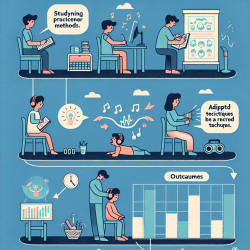Understanding the Impact of Public Charge Rules on Speech-Language Pathology
The recent research paper, "Standing on Their Own Two Feet: How the New Public Charge Rules Could Impact Non-European LPR Applicants," provides a comprehensive analysis of the new Public Charge rules and their potential implications. As professionals dedicated to improving communication outcomes for children, it is crucial for speech-language pathologists to understand how these rules might affect immigrant populations, particularly those from non-European regions.
Key Findings and Their Implications
The research highlights that the new Public Charge rules, implemented in February 2020, expand the criteria for determining the admissibility of legal permanent residency (LPR) applicants. The rules now consider factors such as English language proficiency, income, and the likelihood of future public assistance use. This has significant implications for Mexican and Central American applicants, who are disproportionately affected despite their relatively low use of public assistance.
For speech-language pathologists, these findings underscore the importance of understanding the socio-economic and linguistic challenges faced by immigrant families. Children from these communities may experience heightened anxiety and stress due to their family's immigration status, which can impact their communication development and access to necessary services.
Actionable Steps for Practitioners
To address these challenges, speech-language pathologists can take several data-driven actions:
- Advocate for Policy Change: Engage with local and national advocacy groups to push for immigration policies that consider the well-being of immigrant families and their access to healthcare and educational services.
- Provide Culturally Responsive Services: Tailor interventions to be culturally and linguistically appropriate, ensuring that therapy sessions respect and incorporate the child's cultural background and language.
- Educate and Support Families: Offer resources and workshops for immigrant families to help them navigate the healthcare and education systems, reducing fear and confusion surrounding public assistance programs.
- Collaborate with Community Organizations: Partner with local immigrant support organizations to provide holistic support that addresses both communication needs and broader socio-economic challenges.
Encouraging Further Research
While this study provides valuable insights, further research is needed to explore the long-term effects of Public Charge rules on immigrant children's communication outcomes. Speech-language pathologists are encouraged to contribute to this body of research by documenting and sharing their observations and experiences in clinical settings.
Conclusion
The Public Charge rules have far-reaching implications for immigrant families, particularly those from non-European regions. As speech-language pathologists, it is our responsibility to advocate for equitable access to services and to provide support that acknowledges and addresses the unique challenges faced by these communities. By doing so, we can help ensure that all children have the opportunity to achieve their full communication potential.
To read the original research paper, please follow this link: Standing on Their Own Two Feet: How the New Public Charge Rules Could Impact Non-European LPR Applicants.










